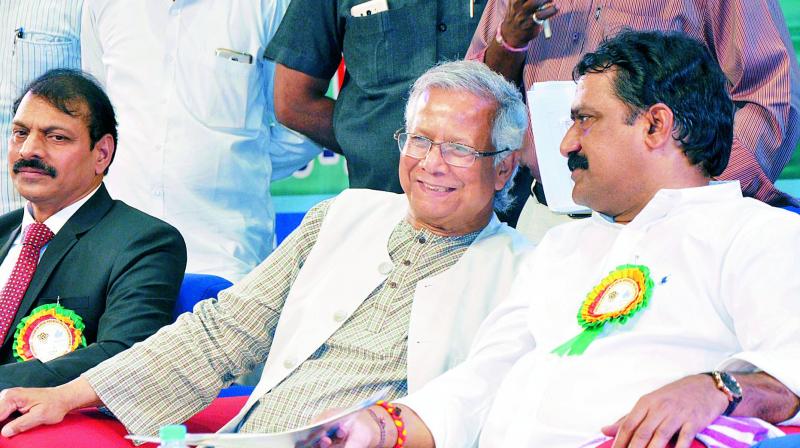Cashless economy best, says Nobel laureate Yunus
Micro-credit system holds great relevance in decreasing poverty: Nobel laureate.

Visakhapatnam: Andhra Pradesh is a pioneer in adopting the micro-credit system in the very early years and has both the best and worst stories of the micro-credit system. Some people abusing it does not mean an end to the micro-credit system in India as it holds great relevance in decreasing the poverty in the county.
These were some of the observations made by Nobel laureate from Bangladesh Prof. Muhammad Yunus, who was in Visakhapatnam on Thursday to participate in the international symposium on ‘Social Business for Sustainable Development‘.
In an interview to Deccan Chronicle on the sidelines of the symposium, Mr Yunus said that it was time to go full blast towards a cashless economy post-demonetisation, instead of discussing its pros and cons.
“Actually, demonetisation is an opportunity for India to go cashless. Besides making sure of taking existing black money back, stopping the whole process of creation of new black money is another challenge to the government. But it’s the government responsibility to create an environment to encourage people to go cashless. By incentivising the online transactions and creating awareness among public can prevent the demonetisation drive going sour,” said Mr Yunus.
When asked whether they have any plans to replicate their micro-credit success story of Bangladesh and the US in India, Mr Yunus said there were no plans as India was already doing well in the micro-finance sphere.
“The Union government should pass a new law to create micro-finance banks for the poor as the existing process was very lengthy. I ask the government to give licences to at least a few NGOs to set up micro-finance banks. So that they can take deposits and give the poor loans instead of depending on the donations. Andhra Pradesh and Karnataka account for 50 per cent micro-finance turnover in the country,” Mr Yunus added.
He said they had been lending about $2 billion a year to about 9 billion borrowers. “About 97 per cent borrowers of our bank are women. We suspend our operations and double up as a humanitarian institution during the times of natural calamities to extend help to the people in Bangladesh,” he added.

